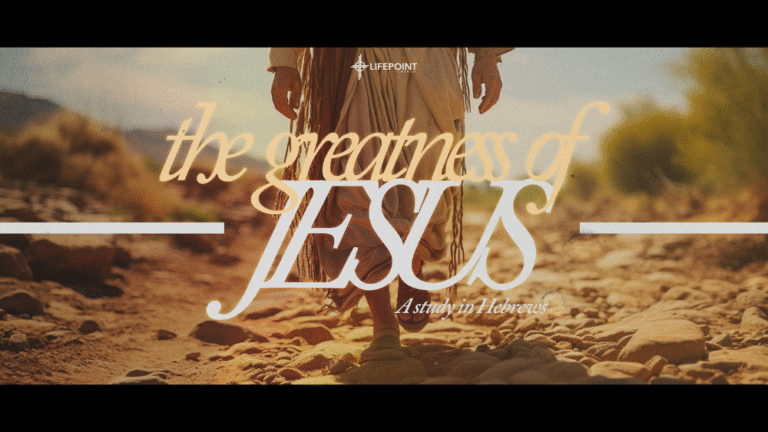How’s Your Hearing? How’s Your Growing?
Jesus Is Better · Hebrews 5:11–6:20
Big Idea:
Spiritual maturity begins with a humble ear and grows through a trusting heart. Listen well, grow deep, and hold fast to your anchor—Jesus.
From Hearing to Growing (5:11–14)
The writer of Hebrews pauses his soaring explanation of Jesus’ priesthood with an honest assessment: “You have become dull of hearing.” They weren’t ignorant; they were inattentive. The problem wasn’t access to God’s Word—it was appetite for it. They still lived on milk when they should have been ready for solid food. In other words, they had heard the gospel but had not trained their hearts to obey it.
Hearing God’s Word is never meant to stop at information. Real hearing produces transformation. As we practice obedience, our senses are trained “to discern good from evil.” Maturity comes through use—through walking out what we already know to be true. The more we respond to what God has spoken, the clearer His voice becomes.
Foundations and Warnings (6:1–12)
In chapter 6, the author urges his readers to press on to maturity. He lists the foundational doctrines—repentance, faith, cleansing, laying on of hands, resurrection, and eternal judgment—and says, “Let’s build on these.” The Christian life isn’t about staying in kindergarten forever; it’s about growing up into Christ.
Then comes a serious warning: those who reject the light they’ve received cut themselves off from the only hope that exists. There is no other Savior to turn to. This passage isn’t meant to rob believers of assurance—it’s meant to stir perseverance. God’s people endure not because they never struggle, but because they never walk away from Jesus as their only hope.
The writer uses a vivid picture: land that drinks in rain and produces fruit receives blessing, but land that refuses to bear fruit faces judgment. The difference isn’t how much rain falls—it’s how the soil responds. Genuine faith always responds to God’s grace with growth.
Encouragement for the Faithful (6:9–12)
After the warning comes reassurance: “We feel sure of better things—things that belong to salvation.” God sees your love, your service, your perseverance. His justice ensures He won’t forget the work that springs from your faith. This encouragement isn’t sentimental—it’s anchored in God’s character. He finishes what He starts.
Christian maturity doesn’t happen in a flash; it’s formed through patient endurance. Faith and patience inherit the promises. The call is to keep moving, to keep trusting, to keep growing—because Jesus is worth it.
From Promise to Anchor (6:13–18)
To prove His faithfulness, God reminds us of His oath to Abraham. When there was no one greater to swear by, God swore by Himself. His promise and His nature stand together—two unchangeable things that make His word absolutely secure. When God says something, it’s not speculation; it’s reality waiting to be revealed.
Because of that, we “who have fled for refuge” can hold fast to the hope set before us. Hope isn’t wishful thinking—it’s confident expectation rooted in a trustworthy God. The storms of life may shake us, but His promise does not move. Our hope is tethered to something stronger than our feelings, deeper than our doubts, and more certain than our circumstances.
Jesus: Our Anchor and Forerunner (6:19–20)
“We have this as a sure and steadfast anchor of the soul.” Jesus Himself is that anchor. Anchors don’t remove storms—they hold you steady through them. When faith feels fragile, the chain still holds because it’s fastened to Him. Our anchor is not buried in shifting sand but secured in the very presence of God.
Hebrews adds one more image: Jesus is our forerunner. He didn’t just throw us a lifeline from afar—He went ahead of us “behind the curtain” as our great High Priest. He entered the presence of the Father so that we could follow. Where Jesus has gone, His people will surely go. Every promise of eternity rests on the fact that He has already blazed the trail.
That’s the heartbeat of this passage: don’t give up, don’t drift, and don’t settle for shallow faith. The One who calls you to grow is the same One who holds you secure.
“We have this as a sure and steadfast anchor of the soul, a hope that enters into the inner place behind the curtain, where Jesus has gone as a forerunner on our behalf.” — Hebrews 6:19–20
How This Lands for Us
- Listen actively. Don’t just hear sermons—train your heart to respond with obedience.
- Grow intentionally. Keep pressing toward maturity; faithfulness today shapes fruit tomorrow.
- Hope securely. When life feels uncertain, remember your anchor holds and your forerunner leads.
Keep listening. Keep growing. And keep trusting the One who never fails.

